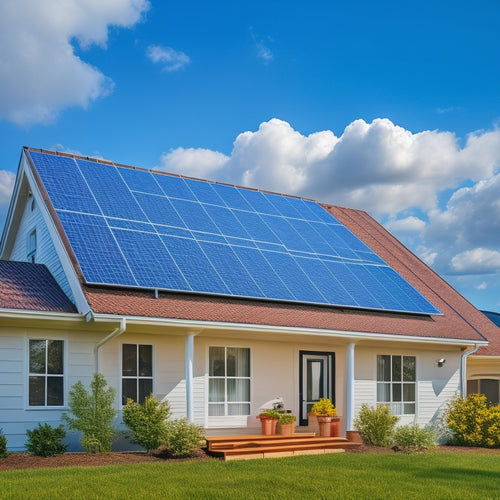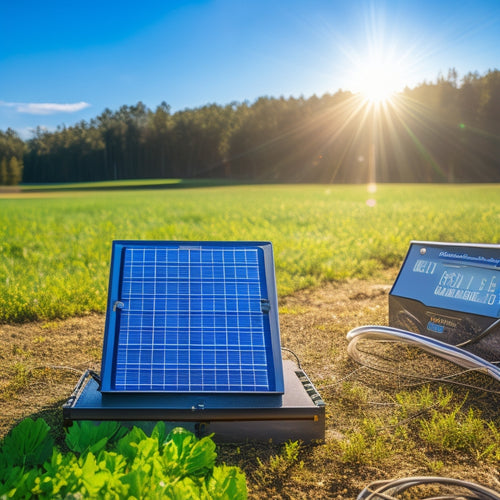
Get Solar Power for Your Home
Share
By getting solar power for your home, you can eliminate energy bills entirely and lock in a fixed energy rate, protecting yourself from rising utility costs and gaining energy independence. With a well-designed solar panel system, you can generate free energy and save money today with tax credits of up to 26% and financing options to cover upfront costs. Plus, solar power can increase your property value by up to 17% and enhance its resale value. To maximize energy harvesting potential, consider optimizing panel angles, evaluating your roof's orientation, and achieving a higher energy conversion rate - and there's even more to investigate on your path to solar energy efficiency.
The Essentials
- Switching to solar power can eliminate energy bills entirely, saving you around $1,500 annually on electricity costs.
- Tax credits of up to 26% are available for solar installation costs, and financing options can cover upfront costs.
- Properly sized solar systems can eliminate energy bills for most households, providing protection from rising energy costs.
- Installing solar power enhances home resale value and adds long-term equity, with potential increases of up to 17%.
- Optimizing panel angles and regular maintenance are crucial for maximizing energy output and ensuring a long-lasting solar power system.
Zero Energy Bills Guaranteed
You can greatly reduce your energy expenses by switching to solar power, and in many cases, eliminate your energy bills altogether.
By utilizing renewable energy, you'll not only reduce your reliance on the grid but also contribute to a healthier environment for future generations.
With a well-designed solar panel system, you'll be generating free energy and offsetting your energy consumption, resulting in zero energy costs.
Save Money Today
A typical American household spends around $1,500 annually on electricity bills, a significant chunk of the family budget. By switching to solar power, you can save a substantial amount of money on your energy bills.
| Benefits | Description |
|---|---|
| Financial Incentives | You're eligible for tax credits of up to 26% of the total installation costs. |
| Energy Independence | Generate your own clean energy and reduce your reliance on utility companies. |
| Lower Installation Costs | The cost of solar panels has decreased by over 70% in the last decade. |
| Maintenance Savings | Solar panels require minimal maintenance and can last up to 30 years. |
| Loan Options | Financing options are available to help you cover the upfront costs. |
With solar power, you'll be protected from rising utility rates and enjoy the environmental benefits of clean energy. By utilizing the power of the sun, you'll be taking a significant step towards energy independence and saving money today.
Zero Energy Costs
Most households can eliminate their energy bills entirely with a properly sized solar power system. You'll be producing clean energy and reducing your reliance on the grid.
With solar power, you'll be shielded from rising energy costs and enjoy energy independence. Imagine having zero energy costs, guaranteed!
By installing rooftop solar panels, you'll not only reduce your carbon footprint but also increase your home's value and appeal. A solar power system designed to meet your energy needs will generate enough electricity to power your home, offsetting your energy bills.
You'll no longer be subject to the whims of utility companies, and you'll be doing your part for the environment. The environmental benefits of solar power are undeniable, reducing greenhouse gas emissions and your carbon footprint.
Increases Property Value Significantly
By installing solar power, you'll enhance your home's resale value fast and add long-term equity.
In fact, solar panels can be a cost-effective solution to reduce your electricity bills, considering the average cost of single solar panels for homes, making it a wise investment for the future.
Studies have shown that solar panels can increase your property's value by up to 17%.
This significant increase in value will benefit you when you decide to sell your home.
Boosts Resale Value Fast
Installing solar panels on your home greatly increases its property value, which means a substantial return on investment when you decide to sell. This enhancement in resale value is due to the numerous benefits that solar panels provide to potential buyers.
For one, they improve your home's aesthetics, making it stand out in the neighborhood. Solar panels are sleek and modern, adding a touch of sophistication to your roof. Additionally, they appeal to environmentally conscious buyers who value energy independence and reduced carbon footprint.
In fact, a study by the National Renewable Energy Laboratory found that homes with solar panels sell faster and for more money than those without. By installing solar panels, you'll not only increase your property value but also make your home more attractive to potential buyers, giving you a competitive edge in the market.
With solar power, you'll be able to sell your home quickly and for a premium price.
Adds Long-Term Equity
The worth of your property increases considerably with the installation of solar panels, making your home a cherished long-term asset. As a homeowner, you reap the benefits of solar power not only through reduced energy bills but also through increased property worth. This translates to a significant financial investment in your home, as solar panels become a desirable feature for potential buyers.
With solar power, you're making a smart home improvement that pays off in the long run. In fact, studies have shown that homes with solar panels sell for higher prices than those without. This is because solar panels are seen as a prized upgrade, providing a clean source of energy and reducing reliance on the grid.
As a result, your home becomes more attractive to buyers who prioritize sustainability and energy efficiency. By investing in solar power, you're not only reducing your carbon footprint but also increasing your property's worth, making it a smart financial investment for years to come.
Maximizes Energy Harvesting Potential
You can maximize your solar panel system's energy harvesting potential by optimizing panel angles to capture the most sunlight.
By adjusting the tilt and orientation of your panels, you can increase energy output and reduce energy losses.
With a reliable and efficient home solar solution, you can guarantee your system operates at its best.
Proper panel alignment can also help minimize shading and reflection, further enhancing your system's overall performance.
Optimize Panel Angles
Optimize Panel Angles
About 30% of a solar panel's energy harvesting potential is lost due to less-than-ideal panel angles. You can't afford to waste that much energy when you're trying to maximize your energy independence. Proper panel placement is essential to getting the most out of your solar panels.
To optimize your panel angles, you'll need to take into account the time of year and the location of your home. In the summer, the sun is higher in the sky, so your panels should be angled more steeply to capture the most energy. In the winter, the sun is lower, so a shallower angle is more effective.
Here's a rough guide to get you started:
| Season | Latitude | Ideal Angle |
|---|---|---|
| Summer | 0-23° | 20-25° |
| Summer | 24-42° | 25-30° |
| Winter | 0-23° | 40-45° |
| Winter | 24-42° | 45-50° |
| Year-round | Any | 30-35° |
Remember to adjust your panel angles seasonally to get the most out of your solar panels. With a little experimentation, you can find the perfect angle for your home.
Increase Energy Output
Properly angled solar panels are just the starting point for maximizing energy harvesting potential. To increase energy output, you'll want to focus on solar efficiency and energy optimization. This involves selecting high-efficiency panel technology that's designed to convert sunlight into electricity at a higher rate.
During installation, techniques like shading analysis can help identify areas where energy production might be compromised, allowing you to adjust panel placement accordingly.
Regular maintenance is also essential, as dirty or damaged panels can greatly reduce energy output. Make sure to follow maintenance tips provided by the manufacturer to keep your system running at peak performance.
Inverter selection is another key factor, as it can impact how efficiently your system converts DC power into usable AC power. Be aware of weather impact and geographic considerations, such as temperature and humidity, which can affect energy production.
Assess Your Roof's Orientation
When evaluating your roof's orientation for solar power, you'll want to take into account the direction your roof faces, as this greatly impacts energy harvesting potential.
Renewable energy sources like solar power can greatly reduce your reliance on traditional electricity and lower your energy bills.
A south-facing roof receives the most sunlight hours, making it ideal for solar panels.
You'll need to assess your roof's direction and sunlight exposure to determine the best placement of solar panels.
Roof's Direction Matters
Your roof's orientation plays a significant role in utilizing solar power, as the direction it faces can greatly impact the amount of energy your solar panels can generate.
Ideally, a south-facing roof receives the most sunlight throughout the day, making it the most suitable for solar panels. However, if your roof faces east or west, you can still generate a significant amount of energy, albeit slightly less than a south-facing roof.
When evaluating your roof's orientation, consider the type of solar panels you'll need. For instance, if your roof receives partial shade, you may require more efficient solar panel types to maximize energy production.
Additionally, the roof materials you have can affect the installation process. For example, asphalt shingles are more common and easier to work with, while metal roofs may require specialized equipment.
Understanding your roof's direction and materials will help you determine the best solar panel system for your home, ensuring you get the most out of your investment and enjoy the freedom that comes with generating your own clean energy.
Sunlight Hours Count
As you evaluate your roof's orientation, it's time to analyze how many sunlight hours your roof receives daily. This is vital in determining the feasibility of solar power for your home. Sunlight availability greatly impacts the performance of your solar panel system. Ideally, your roof should receive at least 4-6 hours of direct sunlight per day. However, even partial shade can still generate some electricity.
Seasonal variations also play a role in sunlight hours. During summer, the sun is higher in the sky, resulting in more direct sunlight. In winter, the sun is lower, and sunlight is more oblique. Your solar panel system's performance will vary accordingly.
To maximize energy production, it's important to take into account these seasonal changes when analyzing your roof's sunlight hours. By doing so, you'll be able to determine the best system size and configuration for your home, ensuring you utilize the most energy from the sun.
With accurate sunlight hour analyses, you'll be one step closer to achieving energy independence.
Higher Energy Conversion Rate
You'll want to maximize your solar panel system's energy conversion rate to get the most out of your investment.
This means achieving the highest possible maximum power output, which is typically measured in watts (W) or kilowatts (kW).
Maximum Power Output
Utilizing maximum power output from your solar panels is essential to optimize your home's energy conversion rate. This means you can generate more electricity from the same amount of sunlight, reducing your reliance on the grid and saving you money on your utility bills.
To achieve maximum power output, you'll want to guarantee your solar panels are operating at peak efficiency. This involves selecting high-quality panels with advanced solar technology that can leverage more energy from the sun.
Additionally, proper installation and maintenance are vital to prevent energy losses due to shading, debris, or faulty connections.
Energy efficiency is also significant in maximizing power output. This includes optimizing your home's energy usage by replacing traditional incandescent bulbs with LEDs, using energy-efficient appliances, and turning off electronics when not in use.
Frequently Asked Questions
Can I Install Solar Panels on a Rented Property?
You'll need your landlord's approval to install solar panels on a rented property, but you can negotiate solar panel agreements that benefit both parties, and investigate renter incentives like community solar programs or portable solar options.
Are Solar Panels Resistant to Extreme Weather Conditions?
As you're caught in a torrential downpour, you'll be relieved to know that solar panels are designed to withstand extreme weather conditions, boasting durability and resilience that'll keep them generating power, no matter what Mother Nature throws their way.
Do Solar Panels Require Regular Maintenance?
You'll be pleased to know that solar panels are relatively low-maintenance; occasional cleaning and inspection are all that's required, keeping maintenance costs minimal, and ensuring a long solar panel lifespan of up to 30 years or more.
Can I Sell Excess Energy Back to the Grid?
You're sitting on a goldmine of excess energy, and now you're wondering if you can cash in. Yes, through net metering benefits and energy buyback programs, you can sell your surplus back to the grid, offsetting your utility bills and increasing your energy independence.
Are Solar Panels Compatible With All Roofing Materials?
You'll find that not all solar panel types are compatible with every roofing material; however, most modern solar panels can be installed on common roofs like asphalt shingles, metal, and concrete tiles, but may require special mounting systems for unique roofing materials.
Final Thoughts
You've made the smart decision to utilize solar power for your home. Now, imagine your energy bills disappearing like autumn leaves in the wind. In fact, according to the US Department of Energy, homeowners who invest in solar panels see an average increase of $15,000 to their property value. With our expert assessment of your roof's orientation and maximized energy harvesting potential, you'll be generating clean energy in no time. Get ready to bask in the savings and glow of being an eco-friendly homeowner!
Related Posts
-

Cost of Solar Panel Installation
You can expect to pay between $15,000 and $30,000 or more for a typical solar panel installation, depending on the sy...
-

Choosing the Right Solar Power Charge Controller
Choosing the right solar power charge controller is crucial for maximizing energy efficiency and extending battery li...
-

Top Solar Powered Camping Fans for Camping Enthusiasts
If you're a camping enthusiast, a solar-powered fan can be a transformative element for your outdoor experience. Thes...


